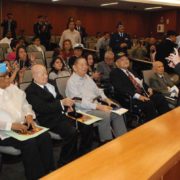The Trump administration is terminating a program that expedited the process for family members of Filipino World War II veterans to come to the United States.
US Citizenship and Immigration Services (USCIS) announced on Friday, August 2 that it will cease the Filipino World War II Veterans Parole program following President Donald Trump’s signing of a 2017 executive order on border security and immigration enforcement that called for determining parole on a “case-by-case basis.”
The administration said it will stop the categorical process and decide per case if the parole has “urgent humanitarian reasons or significant public benefit” as outlined in the Immigration and Nationality Act.
Under the Filipino World War II Veterans Parole program, certain family members of the veterans — who are U.S. citizens or lawful permanent residents — were allowed to live in the U.S. and wait for their immigrant visas to be issued. Relatives could provide immediate support and care for the aging veterans, given that visa wait times for Filipino-American families can exceed 20 years.
Current parolees will still remain under the program until it expires in June 2021, “unless otherwise terminated,” the agency said.
The announcement on Friday also ends the Haitian Family Reunification Parole program.
“Under these categorical parole programs, individuals have been able to skip the line and bypass the proper channels established by Congress. With the termination of these programs, these individuals will no longer be permitted to wait in the United States for their family-based green card to become available, consistent with the rules that apply to the rest of the world,” said USCIS Acting Director Ken Cuccinelli in a statement.
He added, “USCIS is committed to exercising this limited authority in a manner that preserves the integrity of our immigration system and does not encourage aliens to unlawfully enter the United States.”
In November 2014, then-President Barack Obama released executive actions on immigration, resulting in a White House report that recommended a few ways federal agencies can “modernize and streamline” the immigration system, which included introducing this parole program for families of Filipino World War II veterans.
The program also considered cases in which certain eligible relatives could seek parole on their own behalf when their Filipino World War II veteran and his or her spouse are both deceased.
In a tweet on Friday, Hawaii Sen. Mazie Hirono — who led another push for more eligible veterans to apply for the parole program in July — said that the president’s decision to end the program “serves his pathological need to treat immigrants as cruelly as possible.”
“These veterans deserve our appreciation and gratitude, not spite from their unhinged president,” she continued.
For Fil-Ams locally, Friday’s announcement hit close to home.
Melissa Ramoso, state chair of the California Democratic Party Asian Pacific Islander Caucus, said that it was “disheartening” to hear the news, recalling her late grandfather, a World War II veteran whose legacy and service has motivated her past work to help reunite Filipino families.
“The use of parole as a ‘case by case’ basis slows the immigration process for those that it was promised to. Unless there is comprehensive immigration reform now, this administration will continue to discriminate against families of color,” Ramoso told the Asian Journal. “Many of our grandparents were American patriots before setting foot on American soil. What a shame that the country they thought would embrace them as they fought alongside their countrymen, actually doesn’t want them or their families. That is the truth of America now and the America I am sad to live in today. We should all remember this when it comes time to vote Trump out in 2020.”
Estimates show that there are currently less than 6,000 Filipino World War II veterans still living in the United States.
There have been multiple efforts to honor the remaining veterans in recent years, including the Filipino Veterans Equity Compensation Act in 2009 under Obama, which rewarded a one-time lump sum payment to these veterans and their families. Before leaving office, Obama also signed a measure that awarded them with the Congressional Gold Medal, the highest civilian honor given by Congress.
In May, the Filipino Veterans Family Reunification Act was introduced in both the House and Senate to expedite the visa process for children of Filipino World War II veterans.







Hilarious how you worded the title of this headline.
More propaganda
I believe most immediate relatives of WWII Filipino veterans are already living in the U.S.A. If this is the case, ending the program is less of a concern of these Filipino families. Hirono and other democrats are politicizing whatever the Trump administration intend to do or have done for the good of the country and its citizens. God bless America! God bless President Donald Trump in the mighty name of Jesus Christ.